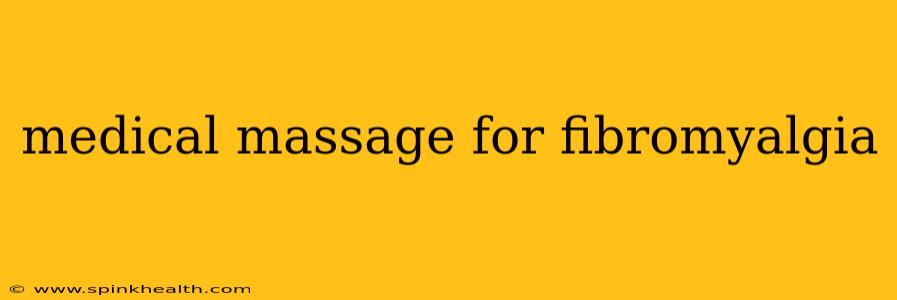Fibromyalgia, a chronic condition characterized by widespread pain, fatigue, and sleep disturbances, can feel like an uphill battle. Many sufferers search endlessly for relief, and for some, medical massage offers a beacon of hope. But what exactly is medical massage, and how can it help those living with fibromyalgia? Let's embark on a journey to uncover the answers.
My own story began with a persistent, gnawing pain that spread across my body like wildfire. Doctors ran tests, offered medications, but nothing seemed to truly address the root of my suffering. Then, a friend suggested medical massage. Initially skeptical, I cautiously booked an appointment, and that decision changed my life. This isn't just a personal anecdote; it's a testament to the power of this specialized therapy for managing fibromyalgia.
What is Medical Massage?
Medical massage is a specialized form of massage therapy performed by licensed professionals with advanced training. Unlike a relaxing spa massage, it focuses on addressing specific medical conditions and improving overall health and well-being. The techniques used are tailored to the individual's needs and often involve a combination of different modalities. This is crucial for fibromyalgia, where personalized treatment is key.
How Does Medical Massage Help with Fibromyalgia?
Medical massage employs a variety of techniques designed to alleviate the symptoms of fibromyalgia. These include:
- Trigger Point Therapy: This focuses on releasing tight muscles and knots, often called trigger points, which contribute significantly to the widespread pain experienced by those with fibromyalgia.
- Myofascial Release: This technique addresses the fascia, the connective tissue surrounding muscles and organs. Fibromyalgia often involves restrictions in the fascia, leading to pain and limited mobility. Myofascial release aims to gently restore its flexibility.
- Swedish Massage: While seemingly gentle, Swedish massage techniques can help improve circulation, reduce muscle tension, and promote relaxation, all crucial for managing fibromyalgia symptoms.
- Deep Tissue Massage: This more intense technique targets deeper layers of muscle tissue to release chronic tension and adhesions. However, it's essential to find a therapist experienced in working with fibromyalgia, as deep tissue massage may exacerbate pain if not administered carefully.
Does Medical Massage Really Work for Fibromyalgia?
The effectiveness of medical massage for fibromyalgia is supported by various studies. While it's not a cure, it has been shown to significantly reduce pain levels, improve sleep quality, and increase energy levels in many individuals. The results are often cumulative, with consistent massage sessions leading to more sustained relief. However, it's important to remember that every individual responds differently, and results may vary.
What are the Potential Side Effects of Medical Massage for Fibromyalgia?
While generally safe, medical massage can have some potential side effects, including:
- Increased Soreness: Some individuals experience temporary muscle soreness following a session.
- Fatigue: While massage aims to increase energy levels, some might feel temporarily fatigued after a session, particularly in the initial stages of treatment.
- Dizziness: In rare cases, individuals may experience dizziness, especially if they have underlying conditions like low blood pressure.
It's crucial to communicate any concerns or pre-existing health conditions with your massage therapist before starting treatment. A skilled practitioner will adjust the techniques accordingly to ensure your safety and comfort.
How Often Should I Get Medical Massage for Fibromyalgia?
The frequency of massage sessions varies depending on individual needs and the severity of symptoms. Many individuals benefit from weekly or bi-weekly sessions initially, gradually reducing the frequency as their condition improves. Your therapist will work with you to create a treatment plan that best suits your circumstances.
Can Medical Massage Replace Other Fibromyalgia Treatments?
No, medical massage should not replace other prescribed treatments for fibromyalgia. Instead, it should be considered a complementary therapy. It works best when integrated into a holistic approach that might include medication, exercise, physical therapy, and lifestyle changes.
Finding a Qualified Medical Massage Therapist
Finding a qualified and experienced medical massage therapist is crucial for optimal results. Look for practitioners with specific training in treating fibromyalgia and other chronic pain conditions. Check for professional certifications and positive reviews.
My journey with fibromyalgia is far from over, but medical massage has become an invaluable tool in my management plan. It's not a magic bullet, but it’s a gentle yet powerful ally in my fight against chronic pain. If you're living with fibromyalgia, I encourage you to consider exploring the potential benefits of medical massage as part of your comprehensive treatment plan. Remember, finding the right therapist and building a strong therapeutic relationship is key to your success.

